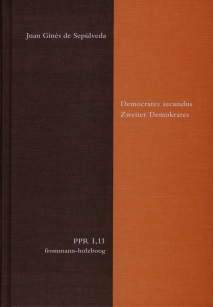You are here
Series » Politische Philosophie und Rechtstheorie des Mittelalters und der... » Abteilung I: Texte »Juan Ginés de Sepúlveda: Democrates secundus. Zweiter Demokrates
Links / Downloads
When in 1550 and 1551, Juan Ginés de Sepúlveda and Bartolomé de Las Casas famously quarreled over the justification of the Spanish conquest of the New World before the Royal and Supreme Council of the Indies at Valladolid, their arguments mostly repeated and reflected a longstanding tradition of the academic discussion of the just war theory. The main tenets of this discussion had been received, collected, expanded and transferred to the specific case of the Conquista during the preceding two generations of Spanish philosophers, theologians and experts in both laws. Particularly the erudite scholar Sepúlveda seems to have given hardly more than a brief sketch of the main tenets that were on the table in the 16th century in the debate of Valladolid, referring to the four key arguments he had assembled and learnedly demonstrated in his ambitiously written, but unpublished dialogue ›Democrates secundus or On the just causes for a war‹ (at the indios). In this dialogue, the four arguments are presented and defended by a learned Greek, Democrates, who tries to prove the legitimacy of the Spanish conquest and dominion in the New World against a German called Leopold, who echoes pacifist views reminiscent of Erasmus of Rotterdam. The four arguments of the ›Democrates secundus‹ are: the barbarian status of the indigenous people and their condition of natural slaves, their offenses against Natural Law, the need for humanitarian intervention given the widespread practice of human sacrifice and anthropophagy, and the right of free religious and cultural exchange. As Sepúlveda presents these arguments, he is eager to show that all of them were advanced by philosophers, jurists and theologians of high reputation: Augustine and Thomas Aquinas, Ulpianus and Gerson, and, above all, Aristotle, whose political philosophy is the basis for Sepúlvedas reasoning throughout the dialogue. It was precisely this kind of reasoning that transferred Aristotle’s theory of natural slavery to the people of the New World which was responsible for the harsh criticism that Sepúlveda had to face from Las Casas and most other Spanish theorists of the time. Due to this criticism, Sepúlveda’s dialogue was never given the royal privilege to be published and it was only in the late 19th century that the first of a very small number of extant manuscripts of the ›Democrates secundus‹ was rediscovered.
Reviews
»Zusammenfassend lässt sich festhalten, dass Christian Schäfer die vorbildliche Erschließung einer wichtigen Quelle zur Kontroverse über den rechten Umgang der Spanier mit den Einwohnern der von ihnen eroberten Gebiete in der Neuen Welt im 16. Jh. gelungen ist. Dies gilt gleichermaßen für die kompetente Einleitung mit ihrer Präsentation von Autorbiographie sowie von Entstehungs- und Wirkungsgeschichte des edierten Dialogs, insbesondere in unmittelbarer Folge seiner Fertigstellung, wie auch für die inhaltliche und argumentative Erschließung des Werks, an der vor allem die Übersichtlichkeit der Darstellung hervorzuheben ist.«
»Es ist das Verdienst von Christian Schäfer [...], den Text Sepúlvedas in einer angesehenen Reihe [...] herausgegeben, eingeleitet und übersetzt zu haben. [...] Die Herausgabe dieses zweisprachigen Textes mit der ausführlichen Einleitung kann nicht genug gewürdigt werden.«
»Man wünscht dem Buch, dass es dazu beiträgt, das lange Schweigen über seinen Inhalt zu beenden. Es kann der Attitüde, die Sklaverei zwar abzulehnen, ihre Annehmlichkeiten aber zu genießen, einen Spiegel vorhalten. Und mehr als das: Wer über Sklaverei und Abhängigkeit forscht, lernt daraus, dass beides nicht nur auf Menschenverachtung und Gewinnstreben beruht, sondern auch auf feingeistigen Distinktionen und Ableitungen und – davon begleitet – auf moralischer Überheblichkeit.«
- Subject Areas
- New Publications
- ---
- Critical Editions
- Collected Works
- Series
- Arbeiten und Editionen zur Mittleren Deutschen Literatur
- Aufklärung und Revolution
- Böhme-Forschungen
- Bibliothek 1800
- Clavis Pansophiae
- Collegium Philosophicum
- Commentaria in Aristotelem Graeca
- Doctrina et Pietas
- Editionen zur Frühen Neuzeit
- Elea
- Europäische Literatur der Frühen Neuzeit
- exempla aesthetica
- Forschungen und Materialien zur Universitätsgeschichte
- Forschungen und Materialien zur deutschen Aufklärung
- Freidenker der europäischen Aufklärung
- Freud heute
- frommann-holzboog Studientexte
- Fundamenta Historica
- Grammatica Speculativa
- Grammatica Universalis
- Kultur und Gesellschaft
- legenda
- Judith Le Soldat heute
- Medizin und Philosophie
- Melanchthon-Schriften der Stadt Bretten
- Mystik in Geschichte und Gegenwart
- Natur und Philosophie
- Neuzeit im Aufbau
- Philosophie interkulturell
- Philosophische Clandestina der deutschen Aufklärung
- Der Platonismus in der Antike
- Politische Philosophie und Rechtstheorie des Mittelalters und der Neuzeit
- problemata
- Psychoanalysis International
- Quaestiones
- Schellingiana
- Specula
- Spekulation und Erfahrung
- Supplementum Platonicum
- Volksaufklärung
- Werkstatt Bionik und Evolutionstechnik
- Bibliographies and Reference Books
- Allgemeine Zeitschrift für Philosophie
- AZP Beihefte
- Jahrbuch der Psychoanalyse
- JP Beihefte
- Steiner Studies
- Open-Access
- Single volumes
- eBooks
- Special Offers
- ---
- Authors
- Publishing house
- Links / Partner
- Paths to Philosophy
